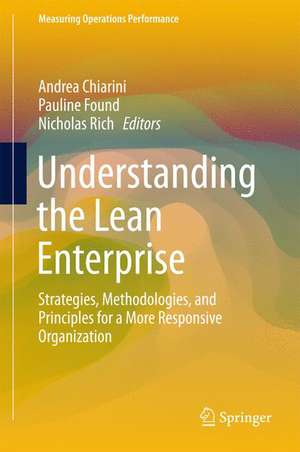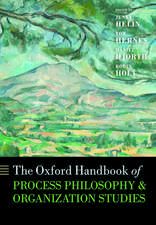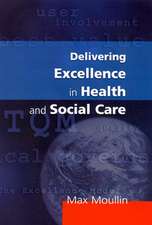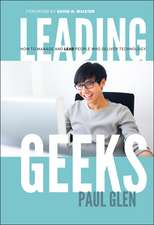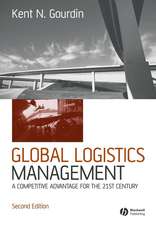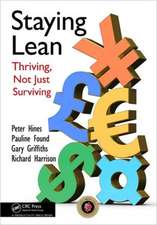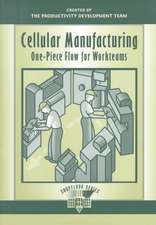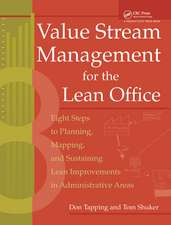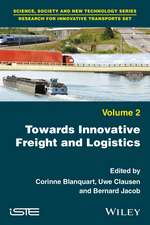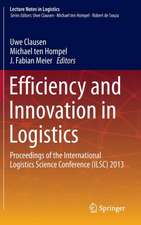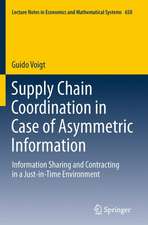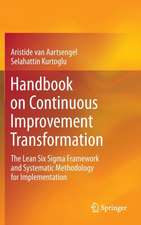Understanding the Lean Enterprise: Strategies, Methodologies, and Principles for a More Responsive Organization: Measuring Operations Performance
Editat de Andrea Chiarini, Pauline Found, Nicholas Richen Limba Engleză Hardback – 21 iul 2015
The book deepens the debate about the lean enterprise from both an academic and a professional management perspective. It thus provides the reader with a sound understanding of the modern lean enterprise and its current evolution. A range of innovative topics are covered, with individual chapters addressing the combinations of lean with hoshin kanri, green management, IT, organizational learning, flow accounting, system thinking, problem solving, internationalization aspects, luxury industry, and product innovation.
Since the term “lean” first entered contemporary operations management language in 1990 to describe a set of practices proven to deliver superior performance over mass production systems, the lean approach to waste reduction and value generation has moved from vehicle production to other manufacturing sectors. It has reshaped the support functions of manufacturing businesses and has evolved from private industry into the public sector. Lean thinking is now a dominant model of operations management and has brought with it a new language and toolbox.
| Toate formatele și edițiile | Preț | Express |
|---|---|---|
| Paperback (1) | 640.37 lei 6-8 săpt. | |
| Springer International Publishing – 17 oct 2016 | 640.37 lei 6-8 săpt. | |
| Hardback (1) | 646.62 lei 6-8 săpt. | |
| Springer International Publishing – 21 iul 2015 | 646.62 lei 6-8 săpt. |
Preț: 646.62 lei
Preț vechi: 760.73 lei
-15% Nou
Puncte Express: 970
Preț estimativ în valută:
123.75€ • 128.72$ • 102.16£
123.75€ • 128.72$ • 102.16£
Carte tipărită la comandă
Livrare economică 15-29 aprilie
Preluare comenzi: 021 569.72.76
Specificații
ISBN-13: 9783319199948
ISBN-10: 3319199943
Pagini: 220
Ilustrații: VI, 287 p. 99 illus.
Dimensiuni: 155 x 235 x 22 mm
Greutate: 0.59 kg
Ediția:1st ed. 2016
Editura: Springer International Publishing
Colecția Springer
Seria Measuring Operations Performance
Locul publicării:Cham, Switzerland
ISBN-10: 3319199943
Pagini: 220
Ilustrații: VI, 287 p. 99 illus.
Dimensiuni: 155 x 235 x 22 mm
Greutate: 0.59 kg
Ediția:1st ed. 2016
Editura: Springer International Publishing
Colecția Springer
Seria Measuring Operations Performance
Locul publicării:Cham, Switzerland
Public țintă
ResearchCuprins
An Implementation Model for Lean and Green.- Lean and IT – Working Together? An Exploratory Study of the Potential Conflicts Between Lean Thinking and the Use of Information Technology in Organisations Today.- Lean Thinking and Organisational Learning: How Can They Facilitate Each Other?.- Flow Accounting: The Next Challenge for 21st Century Lean Businesses.- Changing an Organisation’s Culture with Systems Thinking – A case study from the Financial Services Industry.- Understanding Effective Problem Solving.- Completely Taktless! What Is Pull in the Context of the Process Industries?.- Internationalisation of Lean Manufacturing: The Influence of Environmental Conditions.- Lean Supply Chain Model and Application in an Italian Fashion Luxury Company.- Strategic Planning for Lean Production, Comparing Hoshin Kanri with Balanced Scorecard.- Lean Management and Product Innovation: A Critical Review.- Introducing a Value Improvement Model for Manufacturing (m-VIM).
Notă biografică
Andrea Chiarini is managing director at Chiarini & Associates, a European consulting firm that specializes in Business Management, and Visiting Professor at the University of Ferrara, Italy. He earned a PhD and a Master of Arts from Sheffield Hallam University, UK, and he also gained a Master’s Degree in Electronic Engineering and a Post-graduate Diploma in Business Administration from Bologna University, Italy. He is a Senior Member of the American Society for Quality.
Pauline Found is a Senior Lecturer in Lean Operations at the University of Buckingham and was formerly part of the Lean Enterprise Research Centre (LERC) at Cardiff University. She was educated at The Open University, Cardiff University and Bristol University. She is a Fellow of the Institute of Operations Management (FIOM) and a Member of the American Society of Quality (ASQ). She holds a PhD, MBA, BSc (Hons), BA and a Postgraduate Diploma in environmental management. She was President of the International POMS (Production and Operations Management Society) College of Behavior 2009–2011.
Nicholas Rich is a renowned academic and expert in the fields of productivity management and the application of lean enterprise methods. He has written several books and numerous papers concerning lean manufacturing, policy deployment, total productive maintenance, value stream management and sustaining lean improvements. He holds a number of non-executive directorships and maintains an Honorary Fellowship at Cardiff University (in recognition of his years of service to the college), an Honorary Professorship at Warwick Medical School and a Visiting Scholarship at the University of Bath.
Pauline Found is a Senior Lecturer in Lean Operations at the University of Buckingham and was formerly part of the Lean Enterprise Research Centre (LERC) at Cardiff University. She was educated at The Open University, Cardiff University and Bristol University. She is a Fellow of the Institute of Operations Management (FIOM) and a Member of the American Society of Quality (ASQ). She holds a PhD, MBA, BSc (Hons), BA and a Postgraduate Diploma in environmental management. She was President of the International POMS (Production and Operations Management Society) College of Behavior 2009–2011.
Nicholas Rich is a renowned academic and expert in the fields of productivity management and the application of lean enterprise methods. He has written several books and numerous papers concerning lean manufacturing, policy deployment, total productive maintenance, value stream management and sustaining lean improvements. He holds a number of non-executive directorships and maintains an Honorary Fellowship at Cardiff University (in recognition of his years of service to the college), an Honorary Professorship at Warwick Medical School and a Visiting Scholarship at the University of Bath.
Textul de pe ultima copertă
This publication is in collaboration with the University of Buckingham and is the result of a combined research and review process carried out by the three Editors who belongs to the University of Ferrara, Italy, the University of Buckingham, UK and Swansea University, UK.
The book deepens the debate about the lean enterprise from both an academic and a professional management perspective. It thus provides the reader with a sound understanding of the modern lean enterprise and its current evolution. A range of innovative topics are covered, with individual chapters addressing the combinations of lean with hoshin kanri, green management, IT, organizational learning, flow accounting, system thinking, problem solving, internationalization aspects, luxury industry, and product innovation.
Since the term “lean” first entered contemporary operations management language in 1990 to describe a set of practices proven to deliver superior performance over mass production systems, the lean approach to waste reduction and value generation has moved from vehicle production to other manufacturing sectors. It has reshaped the support functions of manufacturing businesses and has evolved from private industry into the public sector. Lean thinking is now a dominant model of operations management and has brought with it a new language and toolbox.
The book deepens the debate about the lean enterprise from both an academic and a professional management perspective. It thus provides the reader with a sound understanding of the modern lean enterprise and its current evolution. A range of innovative topics are covered, with individual chapters addressing the combinations of lean with hoshin kanri, green management, IT, organizational learning, flow accounting, system thinking, problem solving, internationalization aspects, luxury industry, and product innovation.
Since the term “lean” first entered contemporary operations management language in 1990 to describe a set of practices proven to deliver superior performance over mass production systems, the lean approach to waste reduction and value generation has moved from vehicle production to other manufacturing sectors. It has reshaped the support functions of manufacturing businesses and has evolved from private industry into the public sector. Lean thinking is now a dominant model of operations management and has brought with it a new language and toolbox.
Caracteristici
Explains the modern lean enterprise and its current evolution Offers great insight into the lean operating model Presents results from both an academic and a professional management perspective Includes supplementary material: sn.pub/extras
